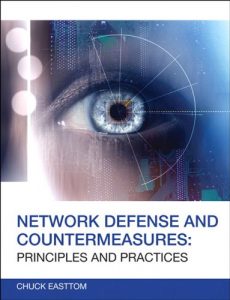Everything you need to know about modern network attacks and defense, in one book
Clearly explains core network security concepts, challenges, technologies, and skills
Thoroughly updated for the latest attacks and countermeasures
The perfect beginner’s guide for anyone interested in a network security career
¿
Security is the IT industry’s hottest topic–and that’s where the hottest opportunities are, too. Organizations desperately need professionals who can help them safeguard against the most sophisticated attacks ever created–attacks from well-funded global criminal syndicates, and even governments.
¿
Today, security begins with defending the organizational network. Network Defense and Countermeasures, Second Edition is today’s most complete, easy-to-understand introduction to modern network attacks and their effective defense.
From malware and DDoS attacks to firewalls and encryption, Chuck Easttom blends theoretical foundations with up-to-the-minute best-practice techniques. Starting with the absolute basics, he discusses crucial topics many security books overlook, including the emergence of network-based espionage and terrorism.
¿
If you have a basic understanding of networks, that’s all the background you’ll need to succeed with this book: no math or advanced computer science is required. You’ll find projects, questions, exercises, case studies, links to expert resources, and a complete glossary–all designed to deepen your understanding and prepare you to defend real-world networks.
¿
Learn how to
Understand essential network security concepts, challenges, and careers
Learn how modern attacks work
Discover how firewalls, intrusion detection systems (IDS), and virtual private networks (VPNs) combine to protect modern networks
Select the right security technologies for any network environment
Use encryption to protect information
Harden Windows and Linux systems and keep them patched
Securely configure web browsers to resist attacks
Defend against malware
Define practical, enforceable security policies
Use the “6 Ps” to assess technical and human aspects of system security
Detect and fix system vulnerability
Apply proven security standards and models, including Orange Book, Common Criteria, and Bell-LaPadula
Ensure physical security and prepare for disaster recovery
Know your enemy: learn basic hacking, and see how to counter it
Understand standard forensic techniques and prepare for investigations of digital crime
¿






